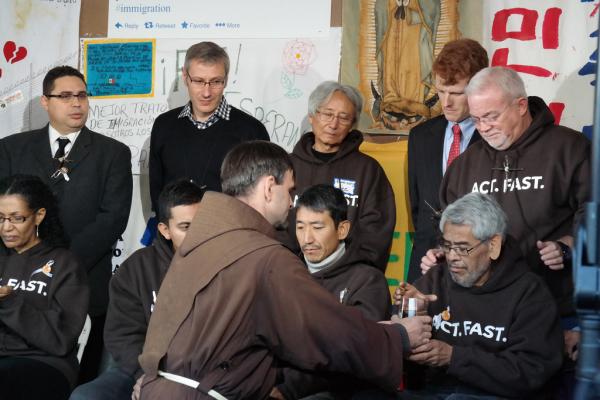I completed my fast. I fasted for seven days as a participant in the Fast for Families: A Call for Immigration Reform & Citizenship. I fasted because Jesus cared about the "least of these" in his society, and as a follower of Jesus, I'm called to do the same. More specifically, I undertook this fast to raise awareness of these particular "least of these" in our society.
I was quite certain that some within my community of influence would disagree with me on this particular spiritual practice, whether theologically, politically, or socially. The pushback I did receive turned out to be more theological than anything. Perhaps that is just because of the circles I am in, but it went something like this, “I’m all for fasting as a personal spiritual thing, but associating it with a political cause is just wrong. Jesus came to save us from our sins and keep us individually out of hell.” The assumption is that Christianity has nothing to do with Public Square.
I'm still processing the political and governmental, not to mention partisan, implications of immigration reform. I'm certainly not under the impression that one simple bill at a federal level will "fix" immigration any more than the Civil Rights Act of 1968 fixed discrimination. Which of course is not to say that either is unimportant.
I'm not directly affected by immigration on a daily basis. Obviously many others are affected, and I want to raise both my and my community's awareness of the issues at hand. I have a strong conviction that we, as a society and in our various communities, are capable of solving our most pressing problems if we are willing to listen to one another and let the issues see the light of day. One of the challenges with any group of the "least of these" in a society is that they are often isolated to the shadows and fringes.
Jesus seems abundantly clear that when we care for those on the margins of our society we are, in fact, caring for the Incarnate One. My hope is that by participating in a public fast the light of day will shine on immigration reform. Even in the dark, waning light of winter may the light shine as we seek effective solutions for those left out and left behind in the immigration debates.
Four things I learned while fasting:
1. Slow – Fasting slowed me down considerably. It made me focus and move more slowly. I couldn’t do as much and that made what I did more intentional and purposeful.
2. Cold – Fasting slowed my metabolism down and with fewer calories to burn I was cold most of the time. I couldn’t help but think of those in the margins who live without proper clothing or shelter in these cold months.
3. Hunger – Yes, I was hungry. But the most intense hunger pains passed after about three days. I also didn’t feel hungry all the time; it came in waves and was most intense when I was making dinner for my family. This has caused me to think of those who in our society, some of whom are immigrants, who have to choose between feeding themselves and feeding their children.
4. Taste – Fasting reminded me of how much I love food, not just as calorie intake but also as a social act and experience. I love the act of eating and tasting and savoring and doing with my family and friends. As I broke my fast everything I tasted seemed a thousand times more intense and vibrant. And that seems deeply Eucharistic and sacramental. Would that we could all gather around the Lord’s Table for a nourishing, savoring supper as the family of God.
Aaron Klinefelter serves as minister for young adults and families at The Church of the Redeemer in Cincinnati, Ohio. He is also a parent, husband, PTO co-president, gardener, bicycler, and networker. He loves coffee and hospitality.
Got something to say about what you're reading? We value your feedback!
